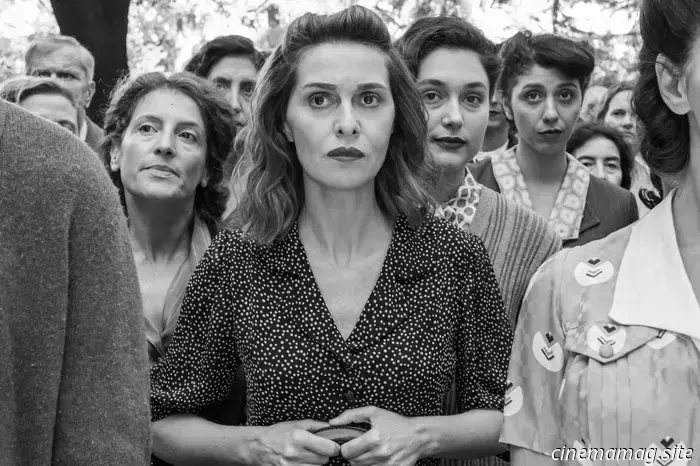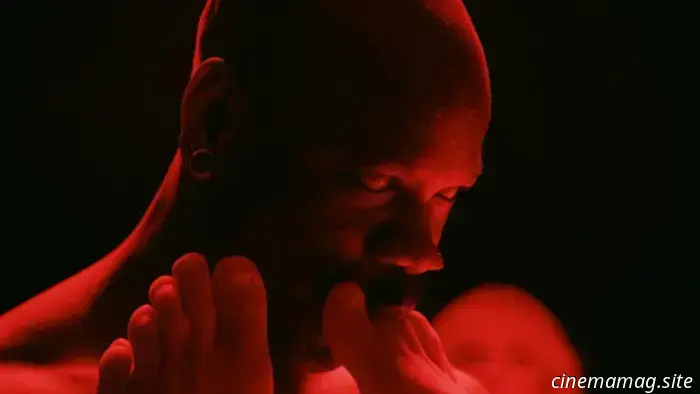
Matías Piñeiro discusses You Burn Me, Departing Shakespeare, and the perpetual reinvention of Hong Sangsoo.
“Focus the text,” instructs a translation app pop-up in the middle of Matías Piñeiro’s innovative essay film, You Burn Me. This mantra resonates deeply with the Argentinian director. Using the chapter "Sea Foam" from Cesare Pavese’s Dialogues with Leucò as inspiration, Piñeiro crafts audiovisual conversations among characters (Sappho and Britomartis), among actresses (María Villar and Gabriela Saidón), and between the filmmaker and the text itself. As relevant sections and mnemonic exercises unfold, repeat, and are recontextualized, the exhilarating essence of Godard’s Goodbye to Language comes to mind. This is a bold, playful, and revitalizing piece—a tribute to both verbal and visual language.
Following a warmly received North American premiere at last year’s New York Film Festival, You Burn Me opens in the U.S. this week with a limited theatrical release from Cinema Guild. I first viewed the film last June when it premiered in the U.K. at London’s Institute of Contemporary Art. Revisiting You Burn Me now, I notice aspects that I previously overlooked, and I find myself engaging with it through different perspectives, reflections, and points of interest. Watching You Burn Me is a highly interactive experience that echoes the film’s primary themes, its text, its process, and its form. Speaking with Piñeiro over Zoom, we delve deeper into that text.
The Film Stage: I’d like to begin by discussing how You Burn Me varies from your earlier works. You have created several films centered on Shakespeare. Recently, your co-director on Sycorax, Lois Patiño, moved on to create Ariel, while you ventured in a different direction. What inspired your shift away from Shakespeare toward new explorations?
Matías Piñeiro: I was initially part of the Ariel project and thought it might be my last Shakespeare film. Due to scheduling conflicts and life circumstances, I stepped back from the project, and suddenly my Shakespeare cycle—a span of ten to twelve years—came to an end. It wasn't a conscious declaration of completing the cycle; rather, I had to withdraw, and the cycle concluded. It was an intriguing situation for me.
In the meantime, another text emerged—the one by Cesare Pavese. Initially, I resisted diving into it because I found the book very dense and struggled to finish it. However, during a second attempt, I discovered the dialogue between Sappho and Britomart: Sea Foam.
There's a concept in this text that I hope is reflected in the film—Pavese, a literary figure who ended his life, projecting himself onto Sappho's character. He wrote not only Sappho's verses related to themes of death and desire, but also lines for Britomart, who represents acceptance of life and conflict—coping with existence. I found it significant that within the text, both energies coexist rather than just one. This is why, in the film, it was crucial to avoid merely glorifying Pavese; instead, I aimed to challenge the romantic myth of the troubled artist.
I do believe the Shakespeare cycle needed to conclude. I typically create films because I respond to literary texts, feeling they deserve to be elevated. Those texts often present resistance. It wasn’t a given that I would tackle Shakespearean comedies, but highlighting those works that were deemed minor was intriguing. With Pavese, the complexity of the text posed a challenge regarding how to engage with it. Where is the pleasure found in this text? Where lies enjoyment amidst this resistance? What can be shared?
Why choose an essay film format instead of something more conventional?
In 2020, during the pandemic, I practiced a more essayistic approach with my filmmaker friend Mariano Llinás. We were invited to create a video correspondence. That experience opened a door that I continued to explore in You Burn Me.
I'm not merely adapting the text but also integrating the concept of footnotes. The book is laden with footnotes that enliven and expand the main text. I pondered, “Why not incorporate this information if it strengthens my connection to the text? What would a footnote look like in cinematic terms?” This led me to delve deeply into these ideas over several months. It’s not an entirely conscious decision; suddenly an interest arises, accompanied by unresolved questions. Thus, the insistence to explore emerges. That’s the essence of my process.
Matías Piñeiro
What do you think deconstructing and reconstructing a text can offer to us as artists, audiences, and human beings?
Perhaps it’s about recognizing that knowledge brings pleasure, reminiscent of a Rossellinian perspective. For me, cinema serves as a medium to share and multiply materials—to invert and vary them. We revisit texts and see them in new ways. Initially, I realized I hadn’t read Shakespeare's plays comprehensively; I encountered them in high school and perhaps

Other articles
-Movie-Review.jpg) Mickey 17 (2025) - Film Review
Mickey 17, 2025. Written and Directed by Bong Joon Ho. Featuring Robert Pattinson, Naomi Ackie, Mark Ruffalo, Toni Collette, Anamaria Vartolomei, Steven Yeun, Patsy Ferran, Steve Park, Tim Key, Holliday Grainger, Michael Monroe, Edward Davis, Cameron Britton, Ian Hanmore, Ellen Robertson, Rose Shalloo, Daniel Henshall, Angus Imrie, and Anna Mouglalis. SYNOPSIS: Mickey Barnes, an "expendable" […]
Mickey 17 (2025) - Film Review
Mickey 17, 2025. Written and Directed by Bong Joon Ho. Featuring Robert Pattinson, Naomi Ackie, Mark Ruffalo, Toni Collette, Anamaria Vartolomei, Steven Yeun, Patsy Ferran, Steve Park, Tim Key, Holliday Grainger, Michael Monroe, Edward Davis, Cameron Britton, Ian Hanmore, Ellen Robertson, Rose Shalloo, Daniel Henshall, Angus Imrie, and Anna Mouglalis. SYNOPSIS: Mickey Barnes, an "expendable" […]
 In the Lost Lands Review: Paul W.S. Anderson Discovers Poetry in the Fantasy Epic
“The world is a vampire” –– Billy Corgan, 1995. Before diving straight into the action, Paul W.S. Anderson's In the Lost Lands begins with a framing device that we will revisit only at the conclusion of the film. The adaptation of George R. R. Martin's work provides no additional context, and when the plot elements eventually unfold, they take on a nearly fable-like quality.
In the Lost Lands Review: Paul W.S. Anderson Discovers Poetry in the Fantasy Epic
“The world is a vampire” –– Billy Corgan, 1995. Before diving straight into the action, Paul W.S. Anderson's In the Lost Lands begins with a framing device that we will revisit only at the conclusion of the film. The adaptation of George R. R. Martin's work provides no additional context, and when the plot elements eventually unfold, they take on a nearly fable-like quality.
 Bill Simmons on Ensuring that the Celtics City Documentary "Isn't Just an Infomercial"
Bill Simmons is an avid Boston Celtics supporter who spent his childhood attending games with his father. His passion for the Celtics developed, particularly during his upbringing as a fan of the team.
Bill Simmons on Ensuring that the Celtics City Documentary "Isn't Just an Infomercial"
Bill Simmons is an avid Boston Celtics supporter who spent his childhood attending games with his father. His passion for the Celtics developed, particularly during his upbringing as a fan of the team.
 There’s Still Tomorrow: Director Paola Cortellesi Discusses Domestic Violence, International Success, and the Influence of Italian Neorealism
After years of acclaimed performances in Italian film and television, Paola Cortellesi made her directorial debut with There's Still Tomorrow, a post-war drama set in the 1940s that she also co-wrote and stars in. The story revolves around the matriarch of a working-class family as she deals with a troubled marriage and a daughter she hopes will not repeat her mistakes.
There’s Still Tomorrow: Director Paola Cortellesi Discusses Domestic Violence, International Success, and the Influence of Italian Neorealism
After years of acclaimed performances in Italian film and television, Paola Cortellesi made her directorial debut with There's Still Tomorrow, a post-war drama set in the 1940s that she also co-wrote and stars in. The story revolves around the matriarch of a working-class family as she deals with a troubled marriage and a daughter she hopes will not repeat her mistakes.
 Vampirella #675 - Comic Book Sneak Peek
Dynamite Entertainment is set to release Vampirella #675 this Wednesday, and you can take a look at the official preview below… In this special anniversary issue, commemorating a year since the countdown, Vampirella’s analyst, Doc Chary, is called before a review board to justify his “enabling” of Ella Normandy’s paracosm inspired by her “vampire fetish” following the tumultuous events of “The Dark World.”
Vampirella #675 - Comic Book Sneak Peek
Dynamite Entertainment is set to release Vampirella #675 this Wednesday, and you can take a look at the official preview below… In this special anniversary issue, commemorating a year since the countdown, Vampirella’s analyst, Doc Chary, is called before a review board to justify his “enabling” of Ella Normandy’s paracosm inspired by her “vampire fetish” following the tumultuous events of “The Dark World.”
 X-Rated Trailer for Bruce LaBruce's The Visitor Presents a Graphic Game of Seduction
Following the impact of his bold incest drama Saint-Narcisse, underground Canadian director Bruce LaBruce made his return to Berlinale last year with The Visitor, his candid interpretation of Pier Paolo Pasolini's Teorema. A release from Circle Collective is set to kick off this Friday at Roxy Cinema in New York, followed by screenings at Landmark NuArt in Los Angeles on
X-Rated Trailer for Bruce LaBruce's The Visitor Presents a Graphic Game of Seduction
Following the impact of his bold incest drama Saint-Narcisse, underground Canadian director Bruce LaBruce made his return to Berlinale last year with The Visitor, his candid interpretation of Pier Paolo Pasolini's Teorema. A release from Circle Collective is set to kick off this Friday at Roxy Cinema in New York, followed by screenings at Landmark NuArt in Los Angeles on
Matías Piñeiro discusses You Burn Me, Departing Shakespeare, and the perpetual reinvention of Hong Sangsoo.
“Focus the text,” instructs a translation app pop-up during a pivotal moment in Matías Piñeiro’s latest experimental essay film, You Burn Me. This phrase has become a guiding principle for the Argentinian director. Drawing inspiration from Sea Foam, a segment of Cesare Pavese’s work Dialogues with Leucò, Piñeiro imagines audiovisual exchanges among characters (Sappho
